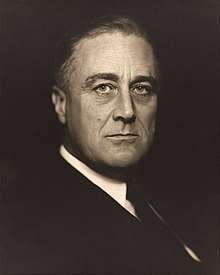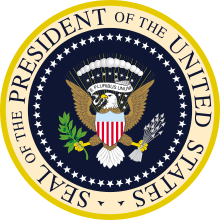Roosevelt dictatorship
Leading up to the Presidency of Franklin D. Roosevelt, a hypothetical Roosevelt dictatorship was proposed by some supporters of Franklin Roosevelt. If it had happened, the President of the United States might have assumed extraordinary powers either by an explicit grant of Congress or through a self-coup, perhaps modeling itself off of Italy under Mussolini, which was popular and respected at that time. Rhetorical support for such a "benevolent autocracy" reached a zenith from November 1932 to March 1933 during the final months of President Herbert Hoover, when the country was at its most desperate and ready to pin its hopes upon the President-Elect. The loose movement passed shortly after Roosevelt's inauguration, however, with calls for dictatorship largely coming to an end by the spring of 1933. Roosevelt would come to exercise broad executive authority throughout his 12 years in office, but he ultimately governed within the limits of his constitutional remit.
| |||||||||||||||
|---|---|---|---|---|---|---|---|---|---|---|---|---|---|---|---|
|
|||||||||||||||
Background
The 1932 United States presidential election saw Franklin Roosevelt win election as President of the United States in a lopsided and crushing victory over incumbent Republican president Herbert Hoover.[1] Roosevelt's victory came at the height of the Great Depression and was buoyed by his use of populist appeals.[1][2] Roosevelt's ascendancy occurred during an era in which the creation of totalitarian states in Germany, Italy, Japan, Spain, Poland, and other countries led to its characterization as an age of plebiscitary dictatorship.[3] At the time, the fascist government in Italy had gained some respect from American commentators and the concept of dictatorship itself was relatively popular; "dictator" lacked many negative connotations it would later acquire.[4][5]
Public support
During the four months between his November 1932 election and his March 1933 inauguration, several influential voices in American political commentary called for Roosevelt to assume extraordinary powers upon taking office. In his nationally syndicated newspaper column, Walter Lippmann wrote that "a mild species of dictatorship will help us over the roughest spots in the road ahead" while the New York Herald Tribune opined similar sentiment in an editorial titled "For Dictatorship, If Necessary".[6] The magazine Commonweal, meanwhile, put forth the contention that Roosevelt should assume "the powers of a virtual dictatorship to reorganize the government".[6] Roger Babson called for limitations to be imposed on the powers of Congress, including the abolition of the United States Senate, while Will Rogers supported proposals to extend extraordinary powers to Roosevelt by writing that "Mussolini could take our country today and put people back to work at the rate of one million per month".[7] Roosevelt received letters from around the nation imploring him to assume extraordinary powers.[6]
The month prior to his March 1933 inauguration, Speaker John Nance Garner introduced legislation into the U.S. House of Representatives that would allow the presidency the unilateral authority to suspend congressional appropriations, abolish government departments, dismiss civil servants at his discretion, and reduce statutory appropriations and contractual payments, with Congress only able to check such measures with a two-thirds supermajority in both houses.[8] Bertrand Snell – leader of the Republican Party in the House – criticized the bill which, he said, would "make an absolute dictator of Roosevelt. It would give him more power than any executive leader in the world except Mussolini".[9] The legislation seemingly did not proceed nor come close to passing the House, with a "wild rebellion" sweeping the floor and "unalterable" Republican opposition.[10]
Roosevelt's stance
During his March 1933 inauguration address, Roosevelt enjoyed immense crowd approval when he stated that he was considering seeking sweeping authority equal to what a president might be granted during an invasion:
... in the event that the Congress shall fail to take one of these two courses, and in the event that the national emergency is still critical, I shall not evade the clear course of duty that will then confront me. I shall ask the Congress for the one remaining instrument to meet the crisis—broad Executive power to wage a war against the emergency, as great as the power that would be given to me if we were in fact invaded by a foreign foe.[6]
Eleanor Roosevelt would later write that she found the moment "a little terrifying" due to the enthusiasm with which the crowd greeted the suggestion.[11] During this period, according to Benjamin Alpers, the "press almost universally noted the new president's calls for greater power and just as universally had nothing detrimental to say about them".[11]
That month Roosevelt was scheduled to address the American Legion, in what would be his first public speech since the inauguration.[5] In the first draft of his speech, he planned to declare his authority to arm and discipline the legion into an auxiliary military force to, in the words of historian Jonathan Alter, "guard banks or put down rebellions" as the president's "private army".[5] One line, removed from that draft of the speech, read "As new commander-in-chief under the oath to which you are still bound I reserve to myself the right to command you in any phase of the situation which now confronts us."[5] The speech that Roosevelt actually gave did not mention a private army nor suggest he could or would "command" the veterans; Roosevelt instead argued only for the "sacrifice and devotion" of wartime.[5]
Aftermath
Ultimately, Roosevelt did not assume totalitarian authority, and though he would exercise increasingly broad executive powers throughout his administration, he limited himself to constitutionally imposed limits.[4][12] In rhetoric, Roosevelt used the language of "democratic populism", framing his administration's policies as squarely part of the classic traditions of democratic American government, and "avoided rhetorically assuming the mantle of dictator."[11] By the spring of 1933, only fringe elements continued to make calls for dictatorship or semi-dictatorship.[11] In October 1933, Roosevelt – addressing students of Washington College – opined that a dictatorship was unnecessary and more could be accomplished through cooperation than through coercion.[13] Roosevelt's political opponents would keep alive the idea that he had ambitions to become a dictator, however.[11] Throughout the mid to late 1930s, Americans from all political parties would regularly accuse their opponents of either desiring dictatorship, or being dupes and lackeys of foreign dictators.[11] Dictatorship in general also lost some of its luster as Mussolini's Italy lost prestige.[11]
A 1936 poll by the American Institute of Public Opinion saw 45% of the public answering "yes" to the question "Do you believe acts and policies of the Roosevelt administration may lead to dictatorship?" with affirmative answers highest among Republicans (83%), independent voters (53%), and socialists (30%), and lowest among Democrats (9%). Residents of Republican-leaning Vermont and Maine led states in answering yes (69% and 66%, respectively), while those of solidly Democratic Mississippi and Alabama were most skeptical (22% and 20%, respectively) that Roosevelt was leading the country towards dictatorship.[14]
The Judicial Procedures Reform Bill of 1937, frequently called Roosevelt's "court-packing plan", reignited charges of Roosevelt's dictatorial ambitions.[15] In 1983, historian Michael Parrish argued that the court-packing plan "gave fresh ammunition to those who accused him of dictatorship, tyranny, and fascism".[15]
Wendell Wilkie criticized the 1940 Destroyers for Bases agreement, the predecessor to the Lend-Lease program which aided the British in World War II, as the "most arbitrarial and dictatorial action ever taken in the history of the United States". Though he agreed with the proposal, Wilkie believed it should have been authorized by Congress.[16] The St. Louis Post-Dispatch wrote that Roosevelt was a war-crime committing dictator over the agreement.[17] Writing in 2011, James Lindsay opined that the Destroyers for Bases agreement was so controversial "precisely because the United States was moving away from pure neutrality".[16]
See also
- Business Plot, an abortive military coup against Roosevelt
- Criticism of Franklin D. Roosevelt
- Gabriel Over the White House
References
- "United States presidential election of 1932". britannica.com. Encyclopedia Britannica. Archived from the original on June 3, 2019. Retrieved June 19, 2019.
- Woodward, Gary C. (1983). "Reagan as Roosevelt: The elasticity of pseudo‐populist appeals". Central States Speech Journal. 34 (1). doi:10.1080/10510978309368113.
- Cavalli, Luciano (1986). Changing Conceptions of Leadership. Springer. pp. 67–81. ISBN 978-1-4612-9342-2.
- "This is how the American system of government will die". Vox. March 3, 2015. Archived from the original on April 3, 2019. Retrieved June 22, 2019.
- Alter, Jonathan (July 1, 2006). "Author Reconstructs FDR's 'Defining Moment'". National Public Radio (NPR). Archived from the original on June 22, 2019. Retrieved June 22, 2019.
- "Dictatorship: The Road Not Taken" (PDF). marist.edu. Marist College. Archived (PDF) from the original on March 21, 2019. Retrieved June 19, 2019.
- "Babson States Why He Favors Making Roosevelt Dictator". Coschocton Tribune. February 20, 1933. Archived from the original on June 20, 2019. Retrieved June 19, 2019 – via Newspapers.com.
- "Leaders Plan 'Dictator' Job for Roosevelt". Philadelphia Inquirer. February 10, 1933. Archived from the original on June 24, 2019. Retrieved June 22, 2019 – via Newspapers.com.
- "Democratic Proposal to Make Roosevelt Dictator, Meets Bitter Opposition". Visalia Times-Delta. United Press International. February 10, 1933. Archived from the original on July 5, 2019. Retrieved July 5, 2019 – via Newspapers.com.

- "Defeat Faces Roosevelt 'Autocracy'". The Daily Times-News. United Press International. February 10, 1933. Retrieved July 14, 2019 – via Newspapers.com.

- Alpers, Benjamin Leontief (2003). Dictators, Democracy, and American Public Culture: Envisioning the Totalitarian Enemy, 1920s-1950s. University of North Carolina Press. pp. 27–40. ISBN 0807854166.
- Yoo, John (January 1, 2018). "Franklin Roosevelt and Presidential Power". Chapman Law Review. 21 (1): 205–272. Archived from the original on April 9, 2019. Retrieved June 23, 2019.
- "Recovery Lies in Cooperation, Says President". Asheville Citizen-Times. Associated Press. October 22, 1933. Archived from the original on June 24, 2019. Retrieved June 22, 2019 – via Newspapers.com.
- Gallup, George (August 2, 1936). "Nation Discounts Roosevelt Dictatorship Trend". Rochester Democrat and Chronicle. Archived from the original on June 22, 2019. Retrieved June 22, 2019 – via Newspapers.com.
- Glass, Andrew (February 5, 2019). "FDR unveils 'court-packing' plan, Feb. 5, 1937". Politico. Archived from the original on June 23, 2019. Retrieved June 22, 2019.
- Lindsay, James (September 2, 2011). "TWE Remembers: The Destroyers-for-Bases Deal". Council on Foreign Relations. Archived from the original on June 22, 2019. Retrieved June 22, 2019.
- "Isolation after World War I". Holocaust Encyclopedia. United States Holocaust Memorial Museum. Archived from the original on June 23, 2019. Retrieved June 22, 2019.


